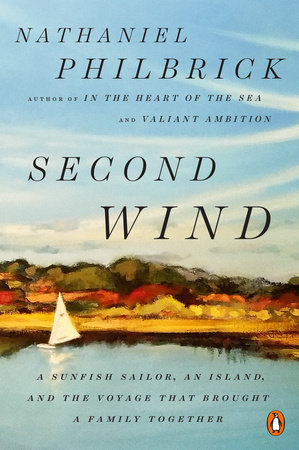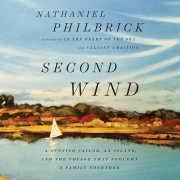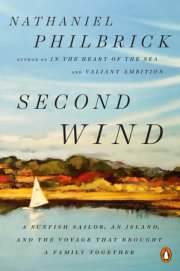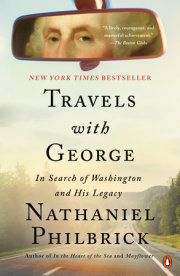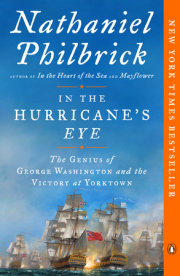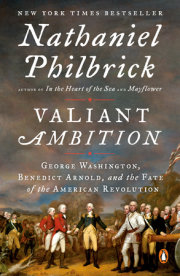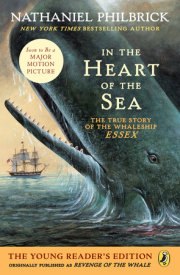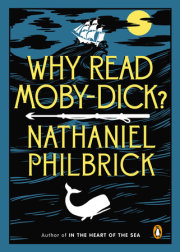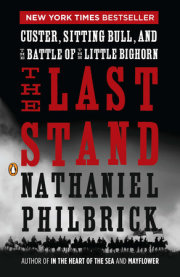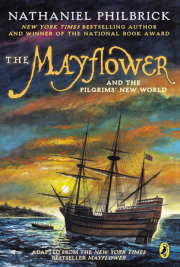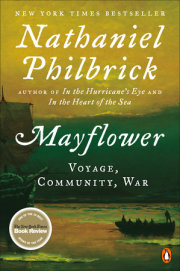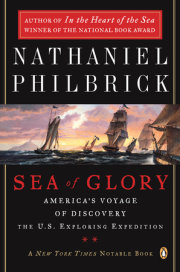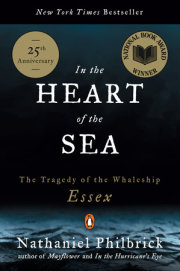The Race I should have known better. You can't just "get" a life.
Six years earlier Melissa and I had tried to do exactly that by moving to the island of Nantucket, twenty-four miles off the New England coast. We had grown tired of living and working around big cities; we wanted more time with our children and with each other; and besides, back then we had both hoped to sail again. Perhaps on Nantucket, once the mother ship of American whaling, we could create an environment for our children in which we were all, figuratively, if not literally, in the same boat.
But it didn't start out the way we had planned. Melissa soon found that life as an attorney on a real-estate obsessed island was as demanding as it had been in the city. For my part, being a housebound writer and parent on relatively tiny Nantucket was even more claustrophobic than it had been in the suburb we had previously called home. An island is a tough place to be landlocked.
But there was more to it than that. Something dark and disturbing would occasionally punch through the surface, reveal just a hint of its massive, lugubrious bulk, then vanish again, only to reappear at the strangest of times. I began to sense that something weird, huge, and scary was, well, out there. And then one February afternoon I saw it-a whale.
It had been back in the days when Ethan still fit comfortably on my shoulders. We were on one of our daily walks along the south shore of the island when the kids and I found ourselves on a bluff overlooking a winter beach and a crowd of people clustered around the black lifeless shape of a young humpback, less than twenty feet long. In her death spasms she'd vomited her stomach lining, and the placenta-like mess floated in the waves beside her. Two men with clipboards and waders measured the carcass and took notes. Children clambered over the whale's smooth, rubbery body, bouncing on her upturned belly as if she were a trampoline. That February afternoon, with my daughter beside me and my son perched on my shoulders, I first realized that it was time for a change. Like that youthful whale, I was stranded. At some point, I would have to return to the sea.
By the spring of 1992, I was working on a history of Nantucket that gave me a renewed appreciation for the island's maritime traditions. And even before I'd made that America's Cup-induced resolution to get back into serious racing, I found myself making another sailing-related commitment: I had agreed to run the sailing program at the Nantucket Yacht Club. I'd always assumed my days as a sailing instructor were behind me. But Jennie and Ethan were growing up, and as a seasonal position, the job dovetailed nicely with my life as a writer.
That summer Melissa and the kids were given the opportunity to race a borrowed Beetle Cat (known as a Rainbow on Nantucket), the same kind of boat in which Melissa and I had had our first date. Although I was happy for them, it was also frustrating. As they won an impressive number of blue first-place flags, my yacht club duties required that I remain rooted to an NYC support boat. I felt left out of my children's introduction to the sport that had been so important to my own coming of age. And what about me?
As the summer passed, the conversation around the dinner table was becoming unendurable.
Jennie: "How many flags have we won so far?"
Ethan: "Four."
Jennie: "But they're all blue."
Ethan: "I know. I'd like a red one."
Jennie: "Or how about a yellow one?"
Ethan: "Mommy, can we come in third next weekend, please?"
It was clearly time for someone to put my wife and especially my children in their place. By the end of July, I'd come up with Plan Gordon.
Gordon was new to the sport. A marathon runner and bike racer, he had purchased a Beetle Cat only the year before. Although he was obviously in tip-top shape, he lacked the experience to race competitively and was becoming frustrated. He needed some tactical advice and instruction. What he needed, I decided, was me. One Saturday morning I happened to run into Gordon on the yacht club lawn. It was soon agreed that I would crew for him in the first race after I had assisted my staff in setting up the race course.
Part of the beauty of Plan Gordon was the element of surprise. Melissa and the kids would have no idea what they were up against until the last possible moment. And, as luck would have it, they were over on the other side of the harbor when I jumped from the yacht club's mark boat into Gordon's Beetle Cat.
With only a few minutes before the start, I fiddled with the various adjustments to the sail in an attempt to optimize its shape. As I stared up at the flapping panels of Dacron cloth and tugged on some lines, Gordon questioned me about what I was doing. Although I tried to answer as best I could, I found myself irresistibly looking out for the competition: a white Beetle Cat with a green sail and three members of my family on board.
An air horn sounded, indicating that we had three minutes before the start. With a familiar rush of adrenaline, I reached involuntarily for the tiller, but there was Gordon-and he needed some pointers. I told Gordon to sail over toward the committee boat. That's where Melissa and the kids were hanging out, their sail luffing lazily as Ethan dangled his hand in the blue, sun-glinting water. These guys wouldn't know what hit them.
On my cue Gordon tacked, turning us so that we crossed into the wind and ended up beside Melissa, our sail also luffing. The rest of the fleet of about five other boats was behind us, which was good-as long as we didn't cross the line too early.
"Hey, Daddy!" Jennie shouted. "What are you doing out here?"
I chose to ignore her. I did notice, however, that her mother was looking straight at me. Melissa knew exactly what I was up to.
We were down to the last thirty seconds, the most critical time, with that green-sailed Beetle beside us. Ethan, the collar of his yellow lifejacket pressed up against his chin, looked under the boat's sail.
"Hi, Daddy!" he called out.
Once again, I chose to ignore him.
"Daddy!"
"What?" I finally said.
"How ya doin'?"
"I'm doing-"
The starting horn blew, and in a blink of an eye Melissa and company were off. Okay, so I was a little late pulling in the sail, and maybe that's why they were able to surge ahead of us, but if Ethan had just not distracted me . . .
Since sails flutter uselessly like flags when pointed directly into the wind, a sailboat must approach the first "upwind" mark indirectly, tacking back and forth across the course. And where a Nantucket whaleman thought in terms of weather systems and continental currents as he navigated the oceans of the world, a modern small boat racer approaches each momentary change in the wind as if it were a storm front, each point of land as if it were Cape Horn. This hypersensitivity to the elements means that the first leg of a typical race becomes a panicky, zigzag quest for the fastest path to the windward mark.
And as it so happened, halfway up the first leg we caught a nice wind shift on the right-hand side of the course and were suddenly back in contention. Gordon was doing an excellent job of steering the boat, and yet I found it impossible not to be a micromanager, offering a continual stream of advice: "Toward the sail a little bit . . . now away from the sail . . . that's it!"
The first mark of the race was a torpedo-shaped buoy anchored in the harbor channel, not far from the long barrier beach, known as Coatue, that forms the outer edge of Nantucket Harbor. Since the entire, seven-mile length of the harbor empties and fills around the end of this giant sand spit, the current there is usually quite fierce, as much as three to four knots. But all concern for the current was temporarily suspended when I realized that we were battling for first with Melissa and the kids.
The conservative thing for us to do would have been to duck behind Melissa and then tack, essentially following her to the mark. But I was not about to yield. It was all or nothing. I told Gordon that with one perfectly executed tack we could knife in between Melissa and the mark. He looked underneath the sail to see what lay ahead. What he saw obviously worried him. "Are you sure?" he asked.
But by then it was too late. "Tack!" I shouted. As Gordon jammed the tiller over, I realized that I had made a terrible mistake. The tide was rushing in much faster than I had realized. Try as I might to get us moving forward instead of sideways in the current, we were soon wrapped around the buoy.
There is nothing worse than being pinned against a mark in a strong tide. It's humiliating, particularly when your wife and children sail past singing "Found a Peanut."
There are no referees in sailing; it's up to the competitors to discipline themselves. If you commit a foul, by hitting a mark or another boat or by getting in someone else's way, you can exonerate yourself by sailing one or two complete circles (depending on the seriousness of the transgression) as a penalty. It is not a fun maneuver, and after disentangling ourselves from the mark and doing our penance, I apologized to Gordon. To his credit, he seemed completely unflustered by the incident. Who cared if we were now in third? We were still in the hunt, with plenty of race left to sail.
The wind was now from behind, putting us on a broad reach to the next mark. It turned out that Gordon's boat was fast on this point of sail, and we were able to round the next mark in second. Melissa and the kids were still quite a way out ahead.
Then it happened. Suddenly, and for no apparent reason, that green-sailed Beetle turned around and headed right for us. I could see Jennie up on the bow, her long blond hair flowing back in the breeze as she pointed at something in the water while Ethan shouted excitedly from the cockpit. Then, just before we came abreast of them, Melissa spun the boat around, the sail swooping across dramatically as Jennie plunged her hand into the water. The kids began to cheer. What was going on?
Waving a sodden baseball cap in the air, Jennie explained: "I dropped it overboard and Mommy went back to get it."
Melissa smiled and shrugged. I didn't know what Gordon was thinking, but this was more than I could stand. This was a race. To turn back for a stupid hat was unthinkable, particularly when you were in first place. The implication was clear: I can do almost anything and still win.
The gloves were off.
We rounded the last mark with Melissa less than a boat length ahead of us. With one, relatively short upwind leg before the finish, it was time to make things happen. So we tacked in an attempt to find a shift of wind that would help us. But Melissa wasn't about to let us get away with it, tacking almost immediately to position her sail between ours and the wind. So we tacked again-as did, of course, Melissa. It was, in the parlance of the America's Cup commentators on ESPN, a tacking duel to the death.
Beetle Cats are too heavy to tolerate too much tacking, but we put our boats through their paces. Luckily, the boat in third was unable to take advantage of our infighting, and we were still neck and neck going into the finish. On board our boat, the tension was palpable: my hands trembled with excitement; Gordon's eyes blazed with competitive fire.
It was a replay of the first leg. Melissa was approaching the finish line on one tack; we were on the other. The plan, once again, was to suddenly tack just ahead of her, shoot up into the wind, and grab the victory. If it was close, I figured my boys on the committee boat would give us the nod, knowing that their jobs depended on it. I warned Gordon of the impending maneuver, and both of us were glancing toward that green-sailed menace when Gordon laughed. He laughed!
"Will you look at that!" he cried.
"What?" I shouted. "What?"
"Look at your son!"
I squinted through my salt-spattered sunglasses. Ethan was leaning against the combing of the cockpit, his head wobbling drunkenly with each bob of the boat. My God, the kid was asleep! Asleep? At a time like this? Didn't he know he was in the midst of a tacking duel to the death?!
That, I must admit, took the stuffing right out of us. Slam-dunking a mother and her sleeping babe is a difficult thing to do, even if you are the husband and father. By the time Gordon and I pulled ourselves together, it was too late. The moment to pounce had passed, and when we did eventually tack, Melissa walked right over us and took the gun. The worst part was that she and Jennie didn't cheer; otherwise they might have disturbed Ethan.
Up a Creek
Before I knew it, Labor Day had come and gone and the kids were back in school. Time for me to leave the waterfront behind and become a writer again.
But after two weeks researching old documents, I was thinking about sailing again. The Gordon debacle still stung, but I knew that there had to be more appropriate ways to work out a decade and a half's worth of stifled sailing frustrations than taking on my wife and kids in a Beetle Cat. I knew that relief could only come in a Sunfish.
By the end of September I'd learned that the 1993 Sunfish North Americans were to be sailed on a man-made lake in Springfield, Illinois, in July. Illinois? In July? Wasn't it kind of ridiculous, venturing to the Land of Lincoln from the Island of Ahab?
For me the site had one undeniable advantage, however. Lake Springfield was notorious for its light winds. Since I was no longer in the physical condition I'd been in fifteen years before, the lighter the wind, the better. But there was another consideration. By traveling to Lake Springfield I would be, in a sense, returning home.
Copyright © 2018 by Nathaniel Philbrick. All rights reserved. No part of this excerpt may be reproduced or reprinted without permission in writing from the publisher.

